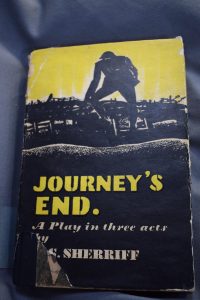This summer, I spent five weeks researching into World War One plays from 1923-1935 with Dr David Griffith, a senior lecturer in the English Literature department. The research I did over this project is to be used by him in future research considering theatre of the war, and also on the final year English module, which I am taking, ‘Remembering World War One.’ My research quest was to find out why Journey’s End, a war play first performed in 1928 and written by ex-soldier R. C. Sherriff, became such a global success. Journey’s End and its success was to be my focal point, but I also interrogated why other war plays, of which there were many, have slipped into the background and today can largely only be found hidden away in research libraries.
Upon starting the project, I was apprehensive about spending so much time alone and venturing into research libraries. However, as soon as I started researching in the Cadbury Research Library, I found that I need not have been so worried. The hours slipped by, and someone was always there if needed to offer some words of advice. I spent the first three weeks of the project solely in the Cadbury Research Library muddling my way through their magnificent ‘Theatre Collection’ and ‘Noël Coward Collection’. The items relating to Journey’s End and Noël Coward’s little-known polemical play Post-Mortem were numerous and fascinating. I loved not simply reading the plays but mapping out their performance history. By the end of these weeks, I had over 600 photographs, had lost count of the amount of theatre reviews I had read, and yet I yearned to read more.

The UGRS scheme did not just introduce me to plays I had never heard of before, but perhaps more importantly to the realities of academic research. I would be lying if I said that there weren’t days where I felt a little disheartened with the progress I was making. When I went to the British Library to delve into the Lord Chamberlain’s Collection, Dr David Griffith’s email support was invaluable. By the end of the first day, I was beginning to lose hope and was dispirited with my progress. I had spent hours tediously combing through the index cards of the collection, as it is not currently digitally archived, and yet I had very little to show for it. When I emailed Dr David Griffith he encouraged me not to see this as a failure, but instead as a reality of research. The next day, I lowered my expectations, and by the end of the two days I spent researching at the British Library, I can honestly say I was surprised and proud of my research. I want to go back!
Throughout, Dr David Griffith was always on hand to advise, but from the outset I was encouraged to be independent and to read plays and find items which were of interest to me. Initially this was daunting, but by the end of the UGRS scheme, I was grateful that he encouraged this autonomy as it has greatly improved my research skills. The UGRS scheme has given me confidence and furthered my interest in WWI literature, illuminating areas within the field which I would love to interrogate further. The insight I have had into the realities of research has helped me to decide to apply for a masters. I would encourage anyone to apply for the scheme, it was a wonderful experience.
Lydia Manley, BA English
